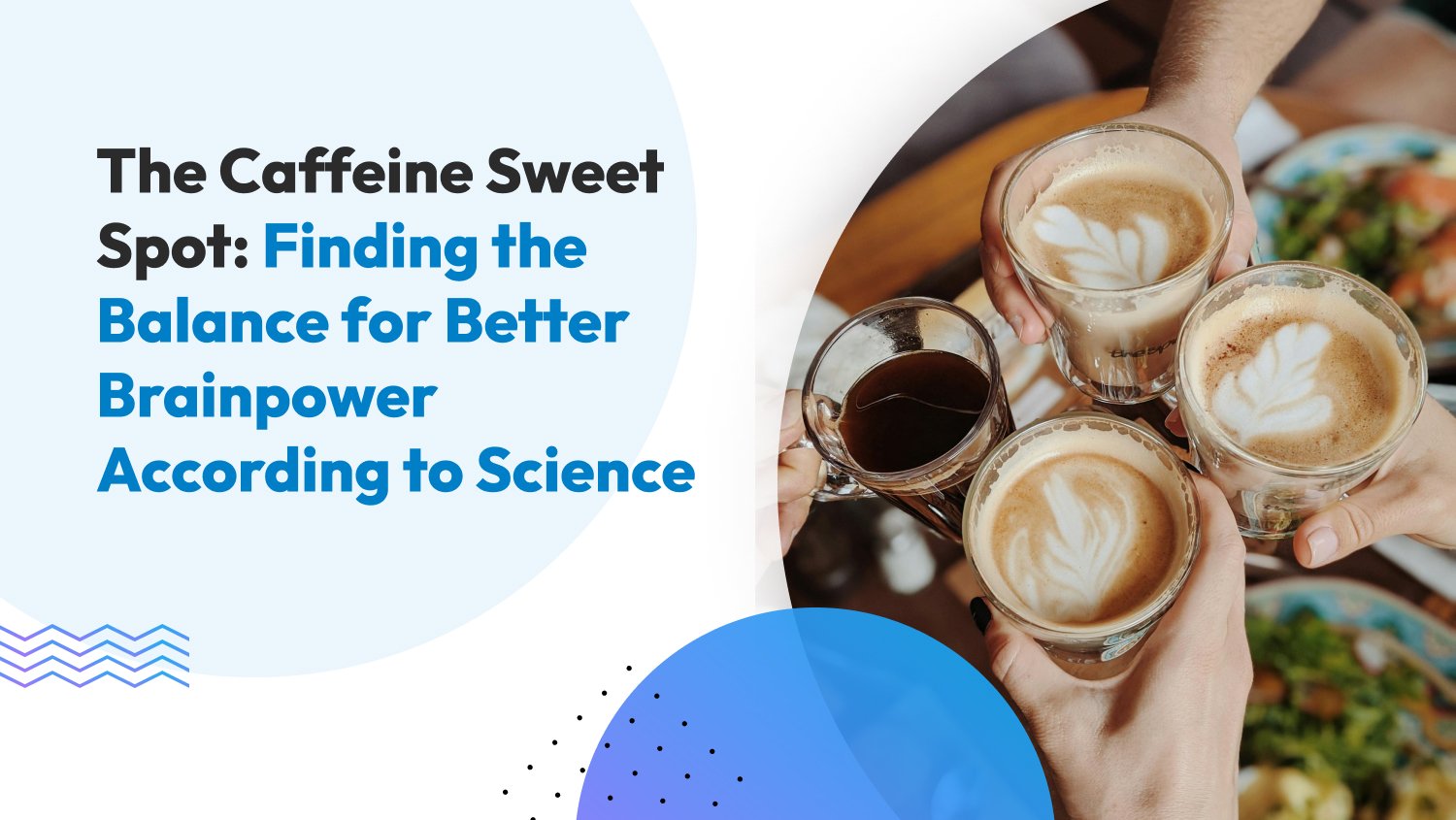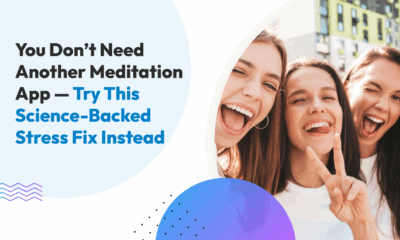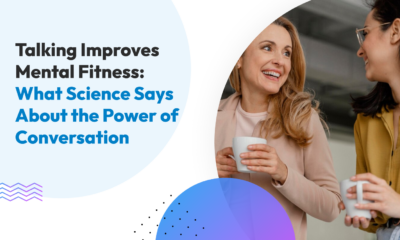Science Says
The Caffeine Sweet Spot: Finding the Balance for Better Brainpower According to Science
Is a cup of coffee part of your morning routine, followed up with another cup or two later in the day?
Like the 73% of Americans who drink coffee daily, you might depend on that jolt of caffeine to jumpstart your brain at the beginning of the day, after lunch, or if you need to work extra hours into the night. It’s long been accepted that the stimulant effect helps us with alertness and clearer thinking so three to five cups a day has become a habit for many.
But is it possible that coffee, or whatever other caffeinated drink, makes us feel alert, but doesn’t really make our brain work better? This study tested the impact of continuous caffeine intake, similar to the regular coffee habit of the average American, on how well we focus and process information.
The experiment took 20 healthy young men who were regular caffeine consumers and tested their performance on simple and more complex memory tasks after 10 days of daily caffeine dosing, 10 days on placebo (no caffeine), and a day after stopping 9 days of caffeine intake (withdrawal). The results may surprise you!
Note: This article is not meant to provide medical, nutritional, or supplemental advice. The experiment was conducted on a small sample size with very specific characteristics which may mean the findings may not be applicable to you. Please consult your physician or medical professional for any changes to your caffeine intake.

One-off caffeine shot seems to improve attention, but not much more than that
Before we talk about the findings for chronic caffeine consumers, let’s touch on what past studies have found about acute caffeine intake. What happens to the brain performance of someone who doesn’t have a caffeine habit when they get a dose?
Existing research indicates that acute caffeine intake has a positive effect on simple attention processes. Consider tasks like staying alert in long meetings or conferences or quickly responding to emails or messages. Researchers consider these “attention processes” which include alerting, orienting, and executive control as basic, pre-requisite functions to higher-order cognitive processes like memory and learning.
In lab experiments, they test attention through tasks where participants are instructed to click a button when they see a target stimulus. The target stimulus could be something like a character or series of numbers, and sometimes with distracting factors like other items on the screen that you should ignore. After a one-off dose of caffeine, researchers found that response time and accuracy generally improved for simple tasks like these.
But does acute caffeine dosing help with more complex working memory tasks? Think of how much brain power you would need if you didn’t have Excel or some other automated tool to help you sort hundreds of clients according to birthdays or who has outstanding invoices according to aging.
In a lab setting, the more complex working memory tasks (called N-back tasks) involve clicking a button when you see a stimulus that was presented N-intervals prior. For example, you are presented with a series of 15 letters, and instructed to click a button when a letter repeats every two intervals (2-back). It requires remembering the rolling target stimulus, counting how many steps have passed, focusing on whether the current stimulus is identical to the target, and executing the required action to signal this – definitely a higher cognitive load test.
The results of experiments on acute caffeine dosing on working memory performance showed caffeine did not improve accuracy or speed for these more complex mental tasks! Participants didn’t do better on N-back tasks compared to when they were under the placebo (without caffeine) condition.
Action Item: These results seem to suggest that if you aren’t a habitual caffeine taker, you can use a one-off cup to help you with simple tasks requiring alertness and quick responses such as, doing basic math, or staying alert and focused doing monotonous tasks. But if you have more complex tasks lined up for the day, a sudden shot of caffeine doesn’t do much good.
But daily moderate caffeine consumption seems to compromise more complex brain processes
Now let’s talk about the findings on continuous caffeine intake and its effects both on attention and more complex cognitive tasks.
In this experiment, for the caffeine condition, participants were given a total of 450mg of caffeine (150g three times a day) every day, roughly in line with what the FDA considers a safe daily limit for healthy individuals. For the withdrawal condition, they took the caffeine pills until day nine, and for the no-caffeine condition, they were given a placebo three times a day. On day ten of each condition, they were tested on 0-back (simple attention test) and 3-back (complex working memory test) tasks.
Surprisingly, researchers found no significant difference in error rates for the simple attention test, whether the subject was on a placebo, caffeine, or withdrawal. However, for the 3-back tests, error rates and reaction time were significantly higher for those that had ten days of daily caffeine doses.
In short, there was no benefit of daily caffeine intake when it came to the simpler attention task. And daily caffeine made participants perform worse in terms of both reaction time and accuracy, in the more complex working memory task.
Action Item: Monitor the performance effect of your daily coffee habit for different types of tasks. Experiment with a no-coffee/no-caffeine stretch and compare whether you actually gain benefits in performance in terms of response time, ease in remembering things, decision-making, and planning. Be mindful of the withdrawal period though, which we will discuss next.
Caffeine withdrawal impairs performance in simple and complex brain tasks as well
This experiment highlighted the tangible effects on performance when you suddenly stop a daily caffeine habit. The withdrawal condition was implemented by skipping five of six doses in the last two days of the ten-day trial period.
For the simple recall task, while error rates weren’t worse, reaction times were slower than both no-caffeine and daily caffeine conditions. For the more complex memory task, the error rates were significantly higher than the no-caffeine group.
Action Item: If experimenting with adjusting your caffeine intake, be mindful of the withdrawal period. This is believed to peak at 24 to 36 hours from last consumption, when you would expect less than optimal brain performance relative to no caffeine intake. Don’t schedule high bandwidth tasks like client meetings or presentations, planning and brainstorming sessions, problem-solving, or creative work during these periods, if possible.

Could ten days off caffeine be enough to regain better brain performance?
The experiment was designed such that each of the 20 participants underwent all three conditions (a crossover design) in a randomized order. Some went through caffeine first, then withdrawal, then placebo while others were assigned to the five other permutations of the conditions. But across all the sequences, the performance for the placebo or zero caffeine subjects in terms of accuracy and reaction was always significantly better.
This suggests it can take as little as ten days to eliminate the effects of caffeine on attention and working memory brain function.
Action Item: This gives you a good timeline to work with should you be willing and able to test how you perform under daily caffeine vs caffeine-free mode. Allocate at least ten days to let the caffeine work through your system and observe whether you actually have better focus and working memory capacity.
It is important to note though, that while the study used a ten-day placebo period as the baseline “no caffeine” condition, this study was not specifically designed to determine the precise time course of reversing the effects of chronic caffeine intake. Individual responses may vary, and some residual effects may persist beyond ten days in some individuals.
Caffeine-induced increase in brain activity isn’t sustainable and doesn’t equal better performance
One of the key questions of this study was how chronic caffeine intake affected brain activity during recall and working memory tasks. Previous studies on one-off caffeine intake saw significantly increased brain activity compared to non-caffeine takers, which partially translated to better attention. What did the brain MRI results for the chronic caffeine takers show?
Surprisingly, under the daily caffeine condition, participants did not show increased overall brain activity compared to the other conditions. This suggests that one-off caffeine intake provides a short-term boost to brain activity and attention. On a sustained basis, it appears we build tolerance as brain activity is no longer boosted.
More importantly, researchers realized that the level of brain activity does not necessarily translate to performance. MRIs for those with acute caffeine dosing working on more complex working memory tasks showed higher activity levels. But their performance was not better than those who had not had caffeine.
For the current study, there were no significant differences in brain activity across the three conditions. But performance was significantly poorer for caffeine and withdrawal conditions. Which you can take to mean that your brain is working as hard as under no caffeine, but not performing better!
Action Item: Next time you reach for a coffee to pick you up, consider alternative means to improve alertness and focus. For example, a single-session exercise has been found to have a positive effect on brain performance. Meditation, better hydration, and lighter meals can improve concentration and cognitive performance, as well. Consider caffeine cycling where you give your body time to eliminate the effects of chronic intake. Structure your day to maximize focus and avoid burnout.
Long-term caffeine intake potentially changes brain structure and function
While overall brain activity showed no significant difference across conditions, researchers observed that the daily caffeine group showed diminished activity in a specific brain region –the right hippocampus. The hippocampus is associated with memory and learning, and this may explain why the caffeinated participants performed worse on the complex recall tasks.
Researchers also noted that the size of the right hippocampus and the level of brain activity in the region were negatively related to the amount of caffeine in the participant’s system.
These preliminary findings raise the question of whether chronic caffeine intake can have a detrimental effect on young, healthy individuals compared to those who may have diseases or age-related cognitive challenges. Decreased hippocampal size and function were observed in the small pool of 20-something, healthy, non-smoking males who participated in this study. Meanwhile, many other research studies have shown caffeine has neuroprotective benefits for those struggling with age-related cognitive deficits, chronic stress, dementia, and Alzheimer’s disease. The researchers note, “…our findings, compared to earlier evidence, reveal that the impacts of daily caffeine intake in young healthy adults might be divergent from an acute intake or from a deficient or pathological neural system.” So they recommend more systematic studies in a stratified study population.
Action Item: While these observations deserve further study, this is another good reminder to keep caffeine consumption in moderation or less and to build in detox periods. As mentioned earlier, explore alternative methods to improve alertness and the brain’s ability for more complex thinking.
And perhaps more broadly, if you have been depending on more than five cups of coffee to get through every day for some time, maybe it’s worth re-examining your workload, how you can improve your systems, or if you need additional help.

A note on limitations of the study: Individual effects may vary
The previous section touched on one major limitation of this study – the limited participant pool of healthy young males. Those with cognitive impairments seem to experience more beneficial outcomes. Researchers also highlighted that they specifically excluded women in the test group to control for factors like hormones due to contraception or monthly cycles.
They also pointed out that the experiment administered pure caffeine to the participants. Caffeinated drinks contain other bioactive compounds like polyphenols, caffeic acid, and more which can also have beneficial effects in combination with caffeine taken regularly or as a single dose.
Action Item: Your own evaluation of how you do on and off caffeine, and in what amounts is very important. Consider your coffee habit as one of the tools in your productivity toolbox, with the proper medical guidance, which you can leverage or dial down to perform better.
Wrap Up
The distinction between acute and chronic caffeine intake, simple attention process vs complex memory tasks and the healthy vs unhealthy users of caffeine leaves us with a lot of new points to consider when it comes to our coffee/tea/energy drink habits.
A daily caffeine habit can wake us up and make us feel more alert. But it doesn’t necessarily mean we can remember, analyze, and perform more complex thinking tasks better. Withdrawal appears to have a measurable, detrimental impact on our cognitive performance, although a ten-day detox period may be adequate to return to a baseline caffeine-free cognitive capacity.
But before you give up on that latte in the morning, remember the limitations of the study and many other factors that could have been missed in the experiment. With the new findings, you can make a better-informed assessment of your own performance while taking caffeine versus taking breaks off it. Try other methods to achieve alertness and of course, maintain or work towards a balanced lifestyle where caffeine is something you take for pleasure or as part of a ritual and hopefully not something you need massive doses of to get through your day-to-day.












